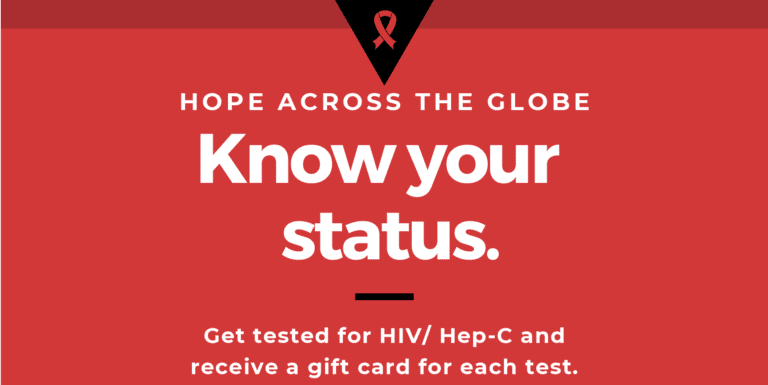How to Know If You Have an STD?
Sexually transmitted diseases (STDs) are a prevalent health concern, affecting millions of people worldwide. The challenge with STDs is that they often don’t show symptoms right away, which can lead to undiagnosed infections and potential health complications. Knowing how to recognize the signs and symptoms of an STD is crucial for early diagnosis and treatment. In this guide, we will explore the common signs of STDs, the importance of STD testing in Jacksonville, and the role of “Hope Across The Globe” in promoting awareness and support for individuals dealing with STDs.
Understanding STDs
What Are STDs?
STDs, or sexually transmitted diseases, are infections that are primarily spread through sexual contact, including vaginal, anal, and oral sex. These infections can be caused by bacteria, viruses, or parasites, and they can affect both men and women.
Prevalence of STDs
STDs are a global health concern. According to the World Health Organization (WHO), more than one million new cases of STDs are contracted daily, and more than 376 million new infections occur each year. The prevalence of STDs underscores the importance of understanding how to recognize their signs and symptoms.
Common Signs and Symptoms of STDs
Recognizing the signs and symptoms of an STD is the first step in seeking diagnosis and treatment. It’s important to note that the presentation of symptoms can vary depending on the specific STD. Common signs and symptoms include:
Unusual Genital Discharge
Unusual discharge from the genitals is a common symptom of many STDs. It may appear as thick, cloudy, yellow, green, or bloody discharge. Both men and women can experience this symptom.
Pain or Discomfort During Urination
Burning, pain, or discomfort during urination can be an indicator of an STD, particularly if it is accompanied by other symptoms.
Genital Sores or Blisters
Open sores or blisters on or around the genital area are a characteristic sign of certain STDs, such as herpes or syphilis.
Itching or Irritation
Itching, redness, or irritation in the genital, anal, or oral areas can be indicative of an STD, such as genital herpes or pubic lice.
Pain in the Lower Abdomen or Pelvic Area
Pelvic pain in women or lower abdominal pain in both men and women can be associated with STDs, including chlamydia or gonorrhea.
Painful Sexual Intercourse
Pain during sexual intercourse, also known as dyspareunia, can be a symptom of an STD, especially if it occurs suddenly and is accompanied by other signs.
Swollen Lymph Nodes
Swollen lymph nodes in the groin, neck, or underarms can be a sign of an underlying infection, including certain STDs.
Flu-Like Symptoms
Some STDs can cause flu-like symptoms, such as fever, fatigue, and muscle aches.
Skin Rashes
Various STDs can lead to skin rashes, which can appear in different forms, such as redness, blisters, or warts.
Jaundice (Yellowing of the Skin and Eyes)
Jaundice is a symptom of hepatitis, an STD that affects the liver. It can cause yellowing of the skin and the whites of the eyes.
Pain and Swelling in the Joints
Pain and swelling in the joints can be a symptom of certain viral STDs, such as HIV or hepatitis B.
The Importance of STD Testing in Jacksonville
Regular STD testing is a critical aspect of sexual health and well-being. In Jacksonville, as in many other cities, access to reliable STD testing services is essential. “Hope Across The Globe” recognizes the significance of STD testing and actively supports initiatives to promote testing. Here’s why STD testing in Jacksonville is vital:
Early Detection and Treatment
Early detection of STDs through testing allows for timely medical intervention and treatment. Many STDs are easily treatable with antibiotics or antiviral medications. However, if left undiagnosed and untreated, they can lead to severe health complications.
Prevention
Knowing your STD status is crucial for preventing the spread of infections to sexual partners. Once aware of their infection, individuals can take appropriate measures to protect their partners, such as using condoms and practicing safe sex.
Peace of Mind
Regular STD testing provides peace of mind, knowing that you are taking control of your sexual health. Whether the test results are positive or negative, knowing your status empowers you to make informed decisions.
Reducing the Stigma
Regular STD testing helps reduce the stigma associated with STDs. It encourages open conversations about sexual health and encourages individuals to seek care and support without judgment.
The Role of “Hope Across The Globe” in STD Awareness
“Hope Across The Globe” is a non-profit organization dedicated to promoting awareness of STDs and providing support to those affected by these infections. The organization actively works to raise awareness, offer educational resources, and advocate for accessible testing and treatment. Here are some of the ways in which “Hope Across The Globe” plays a pivotal role:
Education and Outreach
The organization conducts educational programs and outreach activities to inform the public about STD transmission, prevention, and the importance of regular testing. Knowledge is a powerful tool in the fight against STDs.
Support Services
“Hope Across The Globe” provides support services to individuals living with STDs, including counseling, access to treatment, and resources for managing their condition.
Advocacy
The organization advocates for policies and initiatives that promote STD awareness, testing, and treatment. By collaborating with local healthcare providers and government agencies, “Hope Across The Globe” aims to improve access to testing and care.
Free Testing Centers
To make testing accessible to all, “Hope Across The Globe” operates free HIV testing clinics in Jacksonville and other locations. These centers offer confidential and judgment-free testing services to encourage individuals to get tested regularly.
Challenging Myths About STDs
To extend the article and provide more valuable information, let’s address common myths and misconceptions surrounding STDs:
Myth: Only Promiscuous People Get STDs
STDs do not discriminate based on an individual’s sexual history or the number of sexual partners. Anyone who engages in sexual activity is at risk. It’s important to get tested regularly, regardless of your sexual history.
Myth: You Can Tell If Someone Has an STD by Their Appearance
STDs often do not have visible symptoms, and many infected individuals appear completely healthy. Relying on appearances is not a reliable method of assessing someone’s STD status.
Myth: STDs Are Always Painful
While some STDs may cause discomfort or pain, others can be asymptomatic. For example, chlamydia and gonorrhea can progress silently without any noticeable symptoms.
Myth: STDs Can Be Cured by Home Remedies
Home remedies cannot cure STDs. Many STDs require medical treatment with antibiotics or antiviral medications, and neglecting to seek professional help can lead to complications.
Myth: STDs Are Not Life-Threatening
While many STDs are treatable, some can have serious health consequences if left untreated. For instance, untreated HIV can progress to AIDS, which can be life-threatening.
Promoting Safe Practices and Knowledge
Let’s further explore the importance of promoting safe practices and knowledge related to STDs.
Safe Practices
Promoting safe sexual practices, such as using condoms and regular testing, is essential for preventing the spread of STDs. Open and honest communication with sexual partners about STD status is crucial for ensuring a safer sexual experience.
Knowledge and Consent
Providing comprehensive sexual education and promoting informed consent can empower individuals to make responsible decisions about their sexual health. Knowledge about STDs, transmission, and prevention is key to reducing the risk of infection.
Reducing Stigma
Reducing the stigma associated with STDs is crucial. Stigmatizing individuals with STDs can deter them from seeking testing, treatment, and support. Education and empathy can help break down barriers and create a more supportive environment.
Conclusion
Recognizing the signs and symptoms of STDs is vital for early diagnosis and treatment. STD testing in Jacksonville and organizations like “Hope Across The Globe” are critical resources for individuals seeking to know their STD status, access treatment, and receive support. Challenging myths, promoting safe practices, and fostering knowledge and understanding are essential steps toward a world where STDs are better understood, less stigmatized, and more effectively managed. Remember, taking control of your sexual health is a responsible and empowering choice that contributes to your overall well-being and that of your partners.
Related Tag: STD Treatment Jacksonville FL






